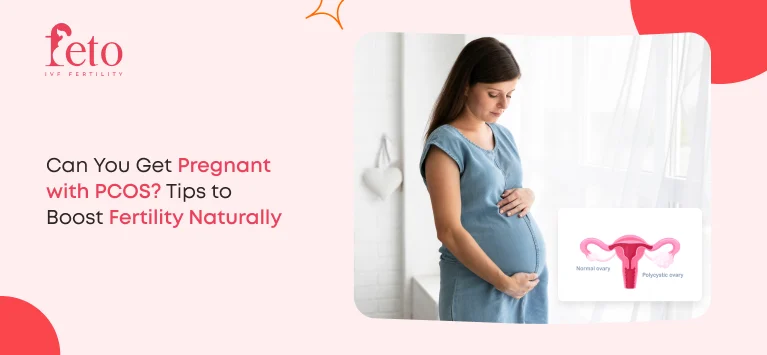
Can You Get Pregnant with PCOS? Tips to Boost Fertility Naturally
Understanding PCOS and Fertility
Polycystic Ovary Syndrome (PCOS) is an overabundant condition that occurs in women of reproductive age. It has an impact on hormone levels and usually results in irregular menstrual cycles. Most women with PCOS are concerned if they will ever become pregnant. The good news is—yes, pregnancy with PCOS is possible. It might require additional effort, but with proper lifestyle modifications and encouragement, most women become mothers.
How PCOS Affects Ovulation?
Ovulation is the release of an egg by the ovary every month. Hormonal imbalance can interfere with the process of ovulation. During abnormal or absence of ovulation, pregnancy chances become less likely. However, the identification of ovulation patterns helps to plan for pregnancy better.
When ovulation is interrupted, the menstrual cycle is irregular. Women do not ovulate for months, and others have late or missing periods. It becomes harder to know when to try to conceive. In others, multiple small follicles in the ovaries form but never grow to release an egg. This is why tracking ovulation becomes very important in PCOS.
Natural Tips to Boost Fertility with PCOS
Making simple lifestyle changes can improve fertility in women with PCOS. These changes regulate the hormones, facilitate ovulation, and prep the body for pregnancy. The following are the best natural tips to enhance fertility with PCOS:
- Get Quality Sleep: Poor sleep impacts insulin and hormone levels. Aiming for 7-8 hours of sleep a night is important, not just for your health, but for your overall hormone regulation of your body. Establishing a regular routine sleep pattern is also important.
- Healthy Diet: A healthy diet promotes hormone balance and regular menstrual periods. Increase your intake of fruits, vegetables, whole grains, and lean proteins. Avoid or limit sugar, processed foods and trans fats.
- Manage Stress: Too much stress affects your hormones and your menstrual cycle. Try meditation, deep breathing, or leisurely hobbies. A relaxed mind allows the body to function better.
- Exercise Daily: Daily exercise improves insulin sensitivity and supports weight control. Exercise at least 30 minutes, five days weekly. Choose walking, yoga, or swimming.
- Healthy Weight: A healthy body weight can put your hormones back into a better balance. In fact, losing just 5-10% of your body weight can help with fertility and ovulation.
Natural Fertility Supplements for PCOS
There are many natural supplements that may benefit fertility for women with PCOS. However, consult a doctor before using any supplement. The following are some of the most common supplements that are used to cure PCOS fertility:
- Folic Acid: Required before and during pregnancy. Helps in healthy egg development and baby growth.
- Omega-3 Fatty Acids: It reduces inflammation and encourages regular menstruation.
- Vitamin D: It is extremely deficient in PCOS. It helps with balancing hormones and egg health.
- Inositol: Helps to enhance insulin levels and facilitate regular ovulation.
Monitoring Ovulation with PCOS
The majority of women with PCOS experience irregular menstrual periods, making it difficult to monitor ovulation. But knowing your time of ovulation is crucial to getting pregnant. There are simple ways to track when you ovulate:
- Basal Body Temp: Chart daily, first thing in the morning. A slight increase in your temperature indicates ovulation.
- Ultrasound Monitoring: Doctors can employ the use of ultrasound to verify if the ovaries are releasing eggs.
- Ovulation Predictor Kits (OPKs): These measure hormone levels in urine to confirm ovulation.
- Cervical Mucus: You want to notice a sticky, clear mucus, similar to egg white.
When to Consult a Fertility Specialist?
Most women conceive using natural methods. Others will still require the assistance of medicine. The following are some indications that it’s time to visit a doctor or fertility specialist:
- Irregular Menstruation: When periods are extremely irregular or not occurring at all, medical assistance may be required to initiate ovulation.
- Age Over 35: If more than 35, and attempting for 6 months without becoming pregnant, seek medical counsel.
- Trying for Over a Year: If less than 35 and not pregnant after 12 months of trying, see a doctor.
- Other Medical Issues: Thyroid disease or diabetes may also lead to fertility issues.
Myths Surrounding PCOS and Pregnancy
There are several myths about PCOS and pregnancy. Removing these myths is important to emotional well-being. Some of these myths and facts are mentioned below:
- Myth: Birth control is the answer to PCOS
Truth: Lifestyle changes and supplements also manage symptoms well.
- Myth: PCOS women never conceive
Truth: PCOS women can become pregnant naturally or with the aid of medication.
- Myth: PCOS disappears after pregnancy
Truth: PCOS remains lifelong. Symptomatic symptoms can be controlled with healthy behaviours, though.
Final Thoughts
PCOS can make pregnancy slightly more challenging, but not impossible. Most women with PCOS have healthy babies. The secret is understanding your body, making slight but consistent lifestyle adjustments, and taking support when required. A little care, patience and proper guidance can make the process smoother.
